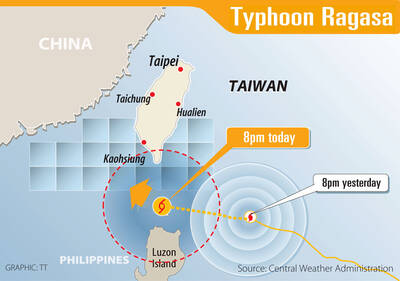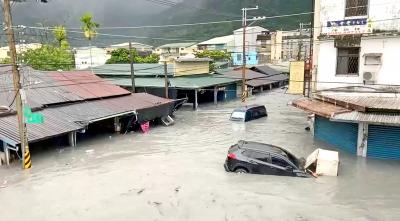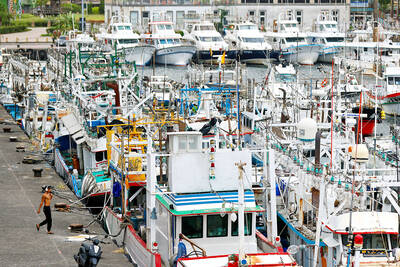Beijing’s passage of legislation to promote patriotism, and including Taiwanese in the law, is an exercise in futility and runs counter to common sense, Premier Chen Chien-jen (陳建仁) said yesterday.
China’s national legislature on Tuesday passed the Patriotic Education Law to strengthen patriotism among children and families so as to counter challenges such as “historical nihilism” and to safeguard “national unity,” state media reported.
The legislation provides a legal guarantee for carrying out patriotic education, Xinhua news agency said, adding that it would take effect on Jan. 1 next year.

Photo: Liu Hsin-de, Taipei Times
“Historical nihilism” is a term Beijing uses to describe views that are critical of the Chinese Communist Party’s version of historical events.
The legislation states that it applies to mainland China, Hong Kong, Macau and Taiwan.
Speaking from the sidelines of a legislative session, Chen said that it is common sense that the rights and duties of Taiwanese can only be defined by laws and regulations passed by the Taiwanese legislature through democratic due process.
“A state that demands patriotism from its people has to earn that love by governing well and being worthy of public trust,” he said.
“Trying to legislate patriotism is like ‘climbing a tree to catch fish (緣木求魚),” he added, using a Chinese idiom describing a futile act.
Mainland Affairs Council Deputy Minister Jan Jyh-horng (詹志宏) said the council is assessing the potential impact of the law on the safety of Taiwanese in China, although the legislation does not stipulate any penalties for noncompliance.
“The experience of countries around the world, especially democratic ones, shows that patriotism can only flow naturally from the heart of the people and cannot be compelled,” he said.
“Compulsory patriotism has a checkered history of success,” he added.
“If China is bent on promoting [patriotism], we would advise it to focus on encouraging Chinese to voluntarily care about their nation,” he said.
Beijing’s passage of a flurry of laws on national security, espionage and patriotic education is a concentrated attack on freedom of speech, said Yeh Yao-yuan (葉耀元), associate professor of international relations at the University of St Thomas.
The vagueness of the legal language in these pieces of legislation is a built-in feature to empower the authorities to more effectively suppress personal freedoms, he said.
The Patriotic Education Law is the latest push in China’s efforts to strengthen state control over speech and provide a basis for imposing penalties and consequences for defiance, said Chen Kuide (陳奎德), executive director of the US-based nonprofit Princeton China Initiative.
Additional reporting by Reuters and CNA

WARNING: People in coastal areas need to beware of heavy swells and strong winds, and those in mountainous areas should brace for heavy rain, the CWA said The Central Weather Administration (CWA) yesterday issued sea and land warnings for Typhoon Ragasa, forecasting that it would continue to intensify and affect the nation the most today and tomorrow. People in Hualien and Taitung counties, and mountainous areas in Yilan and Pingtung counties, should brace for damage caused by extremely heavy rain brought by the typhoon’s outer rim, as it was upgraded to a super typhoon yesterday morning, the CWA said. As of 5:30pm yesterday, the storm’s center was about 630km southeast of Oluanpi (鵝鑾鼻), Taiwan’s southernmost tip, moving northwest at 21kph, and its maximum wind speed had reached

MATAIAN RIVER: Rescue operations were ongoing, with officials urging residents to move to higher floors where possible as teams focus first on those at ground level Floodwaters from the overflowing Mataian River (馬太鞍溪) barrier lake swept into Hualien County’s Guangfu Township (光復) yesterday afternoon, leaving hundreds of people trapped and three missing as of press time last night, the Hualien County Fire Bureau said. The waters surged into downtown Guangfu after the riverbank burst at about 2:50pm, carrying mud and debris and submerging streets to rooftop level in some areas. Residents were seen climbing onto vehicles and rooftops to await rescue as thick, silt-laden water inundated the town. The surge destroyed the Mataian Bridge (馬太鞍溪橋) and flooded the Guangfu Railway Station. Rescue operations were launched with support from fire departments

The Central Weather Administration (CWA) yesterday said that it expected to issue a sea warning for Typhoon Ragasa this morning and a land warning at night as it approached Taiwan. Ragasa intensified from a tropical storm into a typhoon at 8am yesterday, the CWA said, adding that at 2pm, it was about 1,110km east-southeast of Oluanpi (鵝鑾鼻), Taiwan’s southernmost tip. The typhoon was moving northwest at 13kph, with sustained winds of up to 119kph and gusts reaching 155kph, the CWA Web site showed. Forecaster Liu Pei-teng (劉沛滕) said that Ragasa was projected to strengthen as it neared the Bashi Channel, with its 200km

PUBLIC ANNOUNCEMENTS: Hualien and Taitung counties declared today a typhoon day, while schools and offices in parts of Kaohsiung and Pingtung counties are also to close Typhoon Ragasa was forecast to hit its peak strength and come closest to Taiwan from yesterday afternoon through today, the Central Weather Administration (CWA) said. Taiwan proper could be out of the typhoon’s radius by midday and the sea warning might be lifted tonight, it added. CWA senior weather specialist Wu Wan-hua (伍婉華) said that Ragasa’s radius had reached the Hengchun Peninsula by 11am yesterday and was expected to hit Taitung County and Kaohsiung by yesterday evening. Ragasa was forecast to move to Taiwan’s southern offshore areas last night and to its southwestern offshore areas early today, she added. As of 8pm last night,